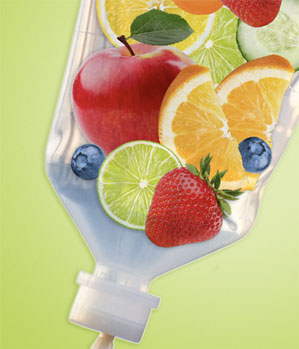Intravenous Vitamin Therapy (IV therapy) is way to receive high doses of vitamins and minerals in a short amount of time. While most people receive vitamins and minerals orally through food or supplements, others have a weak gut that can’t properly process them. Instead of delivering nutrients to the bloodstream, the body eliminates them through urination or a bowel movement. This means the person receives little to no therapeutic benefit from food and supplements.
People turn to IV vitamin therapy as a way to boost their immunity and overall health. The treatment is effective at improving cell functioning, strengthening the immune system, decreasing inflammation, and protecting the body’s cells from further damage. It is also instrumental in halting or reversing symptoms in a variety of health conditions. Regardless of the reason for interest in IV therapy, every person who undergoes it must first submit to several blood tests as well as disclose his or her complete medical history. This is how doctors offering IV therapy decide on the length of treatment and the exact supplements and vitamins to include in the patient’s intravenous mix.
Common vitamins in IV Vitamin Drips include:
Vitamin A
Vitamin A is a fat-soluble vitamin that is stored in the liver, and there are two types of vitamin A. One type is preformed Vitamin A, which is found in animal products, such as dairy, meat, and fish, while the other type, Pro-Vitamin A is found in plant based foods, such as yellow and orange fruits and vegetables, dark leafy greens, spinach, and broccoli. The most common type of Vitamin A is beta-carotene, which is an anti-oxidant and can protect the body from free radicals. Vitamin A helps to develop and maintain healthy teeth, skin, mucus membranes, and skeletal tissue. It also promotes good vision and the ability to see in dim lighting. Low levels of Vitamin A can lead to eye problems and dry, scaly skin.
Vitamin B Complex
B Vitamins are essential in transforming carbohydrates into fuel, energy metabolism, and the production of red blood cells. The Vitamin B Complex includes B1, B2, B3, B4, B5, B6, B7, B9, and B12. Each member of the Vitamin B complex provides different benefits with the most common and most effective being B6 and B12. Vitamin B6 helps to support the cardiovascular, digestive, immune, muscular, and nervous systems, and it is important for healthy hair, skin, liver, and eyes. B6 also produces hormones such as serotonin, melatonin, and norepinephrine. A lack of B6 can lead to depression, confusion, and increased inflammation. B12 keeps the body’s blood and nerve cells healthy, produces DNA, and prevents anemia. A lack of B12 can lead to pernicious anemia, which impairs the body from producing enough red blood cells.
Vitamin C
Vitamin C is a water-soluble vitamin, and it is a major antioxidant that blocks cellular damage formed by free radicals. Because the human body doesn’t produce Vitamin C on its own, people need to consume at least one serving of it every day. Not having an adequate amount of Vitamin C increases the risk of developing heart disease or cancer. It helps to maintain healthy gums and blood vessels, allows people to heal from wounds, fight off infections, helps absorb iron, forming scar tissue, repairing cartilage, bones, and teeth, and developing important proteins that make skin, ligaments, blood vessels, and tendons are all important functions of Vitamin C.
Glutathione
Glutathione is naturally present in the body’s blood and helps to improve liver and brain function. Many people do not produce enough of this important nutrient due to stress, aging, poor dietary habits, pollution, and toxins. This essential nutrient is a master detoxifier and has been known prevent and improve an accumulation of toxins in the body. A deficiency of Glutathione can potentially increase the risks for cellular oxidation, which can lead to damage in the DNA, infections, accelerated aging, heart disease, and cancer. A IV Therapy and Glutathione specialist can help patients to improve their levels of this antioxidant in order to help them prevent disease and benefit existing health conditions.
Some of the conditions that can improve with Glutathione supplementation include cancer, heart disease, liver disease, Chronic Fatigue Syndrome, Alzheimer’s disease, Fibromyalgia, autism, dementia, Epstein-Barr, and Adrenal Fatigue Syndrome. A Glutathione and IV Therapy specialist can help patients to improve their general health or existing conditions.
Magnesium
Magnesium is an essential nutrient that is responsible for over 300 enzyme reactions in the human body each day, and it plays an essential role in coagulating the blood, nerve transmission, energy metabolism, bone formation, and muscle contraction. A lack of magnesium can lead to issues with enzyme reactions, bone loss, muscle cramps, chronic pain, facial tics, and fatigue. Magnesium is found in leafy greens, nuts, seeds, fish, bananas, dried fruit, chocolate, and yogurt. While Magnesium is found in many foods, people that are on prescription drugs, drink a lot of caffeine, or are recovering from surgery can experience lower levels of magnesium. IV Therapy can help to bring Magnesium back to healthy levels.
Additional Vitamins and Minerals include:
- Magnesium Chloride Hexahydrate (Magnesium Chloride)
- Magnesium Sulphate Heptahydrate (Magnesium Sulphate)
- Calcium
- Alpha Lipoic Acid
- Amino Acids
- Electrolytes
- Zinc
- MSM (methyl-sulfonyl-methane)
- Arginine
Because this list is not all-inclusive, patients should inquire about the vitamins and minerals included in their IV Drip and the learn about the benefits of each.


